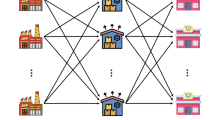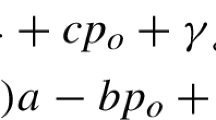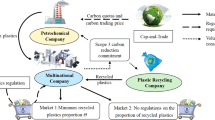Abstract
In this work, we study a dual-channel closed-loop supply chain (CLSC) where the manufacturer sells the new products via one fair caring retailer in the traditional channel and distributes the remanufactured products through her own direct channel in the presence of the carbon tax regulation. After solving the single-period Stackelberg game model by backward induction and analyzing the impacts of key parameters on the optimal pricing strategies and the performance of channel members, a multi-period dynamic Stackelberg game model with heterogeneous players is further established. The local stability of the Nash equilibrium point and complexity properties of the model are investigated by numerical simulation. The results reveal that (1) the retailer’s fairness concern degree is negatively related to the optimal wholesale price as well as positively related to the optimal retail price of the new product. A high level of consumer discount perception for the remanufactured product is conducive to the manufacturer obtaining more profits while it is detrimental to the retailer. (2) The excessive value of the price adjustment speed, carbon tax rate or retailer’s fairness concern degree has a strong destabilization effect on the system’s stability. (3) The manufacturer suffers profit loss while the retailer’s utility levels are elevated when the system falls into periodic cycles and chaotic motions. (4) The delay feedback control method can eliminate the chaos effectively in the dual-channel CLSC system.



















Similar content being viewed by others
Data availability
All the data and material associated with the work are concluded in the text.
Code availability
The code used to support the findings of this study is available from the corresponding author upon request.
References
Andaluz J, Elsadany AA, Jarne G (2017) Nonlinear Cournot and Bertrand-type dynamic triopoly with differentiated products and heterogeneous expectations. Math Comput Simul 132:86–99
Atasu A, Guide VDR, Van Wassenhove LN (2010) So what if remanufacturing cannibalizes my new product sales? Calif Manag Rev 52:56–76
Atasu A, Sarvary M, Van Wassenhove LN (2008) Remanufacturing as a marketing strategy. Manage Sci 54:1731–1746
Benjaafar S, Li Y, Daskin M (2013) Carbon footprint and the management of supply chains: insights from simple models. IEEE Trans Autom Sci Eng 10:99–116
Cao K, He P, Liu Z (2019) Production and pricing decisions in a dual-channel supply chain under remanufacturing subsidy policy and carbon tax policy. J Oper Res Soc 71:1199–1215
Chen JM, Chang CI (2013) Dynamic pricing for new and remanufactured products in a closed-loop supply chain. Int J Prod Econ 146:153–160
Choi S, Messinger PR (2016) The role of fairness in competitive supply chain relationships: an experimental study. Eur J Oper Res 251:798–813
Choi TM, Li Y, Xu L (2013) Channel leadership, performance and coordination in closed loop supply chains. Int J Prod Econ 146:371–380
Cui HT, Raju JS, Zhang ZJ (2007) Fairness and channel coordination. Manage Sci 53:1303–1314
Debo LG, Toktay LB, Van Wassenhove LN (2005) Market segmentation and product technology selection for remanufacturable products. Manage Sci 51:1193–1205
Demirag CO, Chen Y, Li J (2010) Channel coordination under fairness concerns and nonlinear demand. Eur J Oper Res 207:1321–1326
Ding J, Chen W, Wang W (2020) Production and carbon emission reduction decisions for remanufacturing firms under carbon tax and take-back legislation. Comput Ind Eng 143. https://doi.org/10.1016/j.cie.2020.106419
Dou G, Cao K (2020) A joint analysis of environmental and economic performances of closed-loop supply chains under carbon tax regulation. Comput Ind Eng 146. https://doi.org/10.1016/j.cie.2020.106624
Ferrer G, Swaminathan JM (2006) Managing new and remanufactured products. Manage Sci 52:15–26
Du S, Nie T, Chu C, Yu Y (2014) Newsvendor model for a dyadic supply chain with Nash bargaining fairness concerns. Int J Prod Res 52:5070–5085
Du S, Wei L, Zhu Y, Nie T (2016) Peer-regarding fairness in supply chain. Int J Prod Res 56(10):3384–3396
Fanti L, Gori L (2012) The dynamics of a differentiated duopoly with quantity competition. Econ Model 29:421–427
Fehr E, Schmidt KM (1999) A theory of fairness, competition and co-operation. Q J Econ 114:817–868
Ferrer G, Swaminathan JM (2010) Managing new and differentiated remanufactured products. Eur J Oper Res 203:370–379
Gan SS, Wan P, Suparno, Widodo B (2017) Pricing decision for new and remanufactured product in a closed-loop supply chain with separate sales-channel. Int J Prod Econ 190:120–132
Govindan K, Soleimani H, Kannan D (2015) Reverse logistics and closed-loop supply chain: a comprehensive review to explore the future. Eur J Oper Res 240:603–626
Guide V, Li J (2011) The potential for cannibalization of new products sales by remanufactured products[J]. Oper Res 51(4):337–338
Guo Y, Ma J (2013) Research on game model and complexity of retailer collecting and selling in closed-loop supply chain. Appl Math Model 37:5047–5058
He P, He Y, Xu H (2019) Channel structure and pricing in a dual-channel closed-loop supply chain with government subsidy. Int J Prod Econ 213:108–123
He R, Xiong Y, Lin Z (2016) Carbon emissions in a dual channel closed loop supply chain: the impact of consumer free riding behavior. J Clean Prod 134:384–394
Huang M, Song M, Lee LH, Ching WK (2013) Analysis for strategy of closed-loop supply chain with dual recycling channel. Int J Prod Econ 144:510–520
Huang YS, Fang CC, Lin YA (2020) Inventory management in supply chains with consideration of logistics, green investment and different carbon emissions policies. Comput Ind Eng 139. https://doi.org/10.1016/j.cie.2019.106207
Ho TH, Su X (2009) Peer-induced fairness in games. American Economic Review 99:2022–2049
Ho T, Zhang J (2008) Designing pricing contracts for boundedly rational customers: does the framing of the fixed fee matter? Manag Sci 54(4):686–700
Jian J, Li B, Zhang N, Su J (2021) Decision-making and coordination of green closed-loop supply chain with fairness concern. J Clean Prod 298. https://doi.org/10.1016/j.jclepro.2021.126779
Li QH, Li B (2016) Dual-channel supply chain equilibrium problems regarding retail services and fairness concerns. Appl Math Model 40:7349–7367
Li T, Ma J (2014) Complexity analysis of the dual-channel supply chain model with delay decision. Nonlinear Dyn 78:2617–2626
Liu Z, Chen J, Diallo C (2018) Optimal production and pricing strategies for a remanufacturing firm. Int J Prod Econ 204:290–315
Liu W, Qin D, Shen N, Zhang J, Jin M, Xie N, Chen J, Chang X (2020) Optimal pricing for a multi-echelon closed loop supply chain with different power structures and product dual differences. J Clean Prod 257. https://doi.org/10.1016/j.jclepro.2020.120281
Loch CH, Wu Y (2008) Social preferences and supply chain performance: an experimental study. Manage Sci 54:1835–1849
Ma J, Xie L (2016) The comparison and complex analysis on dual-channel supply chain under different channel power structures and uncertain demand. Nonlinear Dyn 83:1379–1393
Ma J, Zhang F, Jiang H (2020) Dynamic pricing game under different channel power structures in a closed-loop supply chain. Int J Bifurcation Chaos 30. https://doi.org/10.1142/s0218127420500522
Ma J, Zhu L, Guo Y (2019) Strategies and stability study for a triopoly game considering product recovery based on closed-loop supply chain. Oper Res Int Journal. https://doi.org/10.1007/s12351-019-00509-w
Ma P, Li KW, Wang ZJ (2017) Pricing decisions in closed-loop supply chains with marketing effort and fairness concerns. Int J Prod Res 55:6710–6731
Nie T, Du S (2017) Dual-fairness supply chain with quantity discount contracts. Eur J Oper Res 258:491–500
Pan K, Cui Z, Xing A, Lu Q (2020) Impact of fairness concern on retailer-dominated supply chain. Comput Ind Eng 139. https://doi.org/10.1016/j.cie.2019.106209
Peng J, Miao Z, Peng F (2011) Study on a 3-dimensional game model with delayed bounded rationality. Appl Math Comput 218:1568–1576
Niu B, Cui Q, Zhang J (2018) Impact of channel power and fairness concern on supplier’s market entry decision. J Oper Res Soc 68:1570–1581
Wang H, Ma J (2014) Complexity analysis of a Cournot-Bertrand duopoly game with different expectations. Nonlinear Dyn 78:2759–2768
Wang Y, Yu Z, Shen L (2018) Study on the decision-making and coordination of an e-commerce supply chain with manufacturer fairness concerns. Int J Prod Res 57:2788–2808
Wu CH (2012) Price and service competition between new and remanufactured products in a two-echelon supply chain. Int J Prod Econ 140:496–507
Savaskan RC, Bhattacharya S, Van Wassenhove LN (2004) Closed-loop supply chain models with product remanufacturing. Manage Sci 50:239–252
Toptal A, Özlü H, Konur D (2013) Joint decisions on inventory replenishment and emission reduction investment under different emission regulations. Int J Prod Res 52:243–269
Tu H, Mao X, Wang X (2019) Complexity of a dynamic hybrid supply chain game model with a service factor. Nonlinear Dyn 97(4):2055–2066
Xie J, Zhang W, Liang L, Xia Y, Yin J, Yang G (2018) The revenue and cost sharing contract of pricing and servicing policies in a dual-channel closed-loop supply chain. J Clean Prod 191:361–383
Xu X, He P, Xu H, Zhang Q (2017) Supply chain coordination with green technology under cap-and-trade regulation. Int J Prod Econ 183:433–442
Yan W, Xiong Y, Xiong Z, Guo N (2015) Bricks vs. clicks: which is better for marketing remanufactured products? Eur J Oper Res 242:434–444
Yang J, Xie J, Deng X, Xiong H (2013) Cooperative advertising in a distribution channel with fairness concerns. Eur J Oper Res 227:401–407
Yang H, Chen W (2018) Retailer-driven carbon emission abatement with consumer environmental awareness and carbon tax: revenue-sharing versus Cost-sharing. Omega 78:179–191
Yang L, Hu Y, Huang L (2020) Collecting mode selection in a remanufacturing supply chain under cap-and-trade regulation. Eur J Oper Res 287:480–496
Yenipazarli A (2016) Managing new and remanufactured products to mitigate environmental damage under emissions regulation. Eur J Oper Res 249(1):117–130
Yu W, Shang H, Han R (2020) The impact of carbon emissions tax on vertical centralized supply chain channel structure. Comput Ind Eng 141https://doi.org/10.1016/j.cie.2020.106303
Zhan X, Ma J, Li Y, Zhu L (2019) Design and coordination for multi-channel recycling of oligopoly under the carbon tax mechanism. J Clean Prod 223:413–423
Zhao L, Chang J, Du J (2019) Dynamics analysis on competition between manufacturing and remanufacturing in context of government subsidies. Chaos, Solitons Fractals 121:119–128
Zhang F, Hu Z, Yang Y, Ma X (2021) Complex dynamics analysis of closed-loop supply chain considering CSR and fairness concerns[J]. Discret Dyn Nat Soc: 1–23
Zhang F, Ma J (2016) Research on the complex features about a dual-channel supply chain with a fair caring retailer. Commun Nonlinear Sci Numer Simul 30(1–3):151–167
Zhang F, Wang C (2018) Dynamic pricing strategy and coordination in a dual-channel supply chain considering service value. Appl Math Model 54:722–742
Zhang Y, Hong Z, Chen Z, Glock CH (2020) Tax or subsidy? Design and selection of regulatory policies for remanufacturing. Eur J Oper Res 287:885–900
Zhang Y, Zhang T (2021) Complex dynamics in a closed-loop supply chain with risk aversion and fairness concerns under supply disruption. Int J Bifurcation Chaos 31(09). https://doi.org/10.1142/S0218127421501327
Zheng B, Yang C, Yang J, Zhang M (2017) Dual-channel closed loop supply chains: forward channel competition, power structures and coordination. Int J Prod Res 55:3510–3527
Zheng X, Liu Z, Li KW, Huang J, Chen J (2019) Cooperative game approaches to coordinating a three-echelon closed-loop supply chain with fairness concerns. Int J Prod Econ 212:92–110
Zhu X, Du J, Boamah KB, Long X (2020) Dynamic analysis of green investment decision of manufacturer. Environ Sci Pollut Res 27:16998–17012
Funding
This work is supported by the Natural Science Fund of Shanghai under Grant No. 19ZR1417200, the Shanghai Municipal R&D Foundation under Grant No. 20511101403, the Humanities and Social Sciences Planning Fund of Ministry of Education of China under Grant No. 19YJA630116.
Author information
Authors and Affiliations
Contributions
Conceptualization: YZ Zhang Yuhao; methodology: YZ Zhang Tao; formal analysis and investigation: YZ; writing—original draft preparation: YZ; writing—review and editing: YZ, TZ; funding acquisition: TZ; resources: TZ; supervision: TZ.
Corresponding author
Ethics declarations
Ethics approval
Not applicable.
Consent to participate and consent for publication
All authors are committed to participate in the work and agreed to publish it.
Conflict of interest
The authors declare no competing interests.
Additional information
Responsible Editor: Roula Inglesi-Lotz
Publisher's note
Springer Nature remains neutral with regard to jurisdictional claims in published maps and institutional affiliations.
Rights and permissions
About this article
Cite this article
Zhang, Y., Zhang, T. Dynamic analysis of a dual-channel closed-loop supply chain with fairness concerns under carbon tax regulation. Environ Sci Pollut Res 29, 57543–57565 (2022). https://doi.org/10.1007/s11356-022-19715-9
Received:
Accepted:
Published:
Issue Date:
DOI: https://doi.org/10.1007/s11356-022-19715-9




